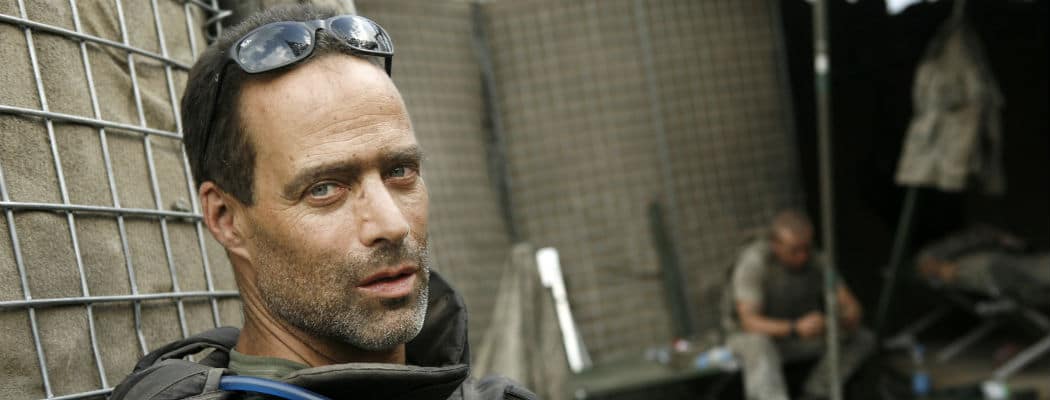This year’s 2016 Nantucket Book Festival has a star-studded lineup of authors making way for the island, from former Poet Laureate Billy Collins to National Public Radio’s internationally renowned host Diane Rehm. Rounding out the distinguished cast is bestselling author Sebastian Junger, who graced the cover of our July 2011 issue. Here’s a look back at our interview with Junger, which came just days before he officially retired from combat reporting.
Few places celebrate Independence Day quite like Nantucket; from the water fight downtown to the fireworks over the harbor, there is no shortage of patriotism come Fourth of July. Yet so often forgotten amidst the beach barbeques and cocktail parties are the many young men and women actively fighting to preserve this way of life for us. On a day when we enjoy all the fruits of being American, it is important to pause and remember those who make our freedoms possible.
 It was in this spirit that N sat down with Sebastian Junger. Starting in 2007, the Massachusetts native – famous for his 1998 international bestseller The Perfect Storm – spent fifteen months following an American platoon in one of the most violent regions of Afghanistan, the Korengal Valley. His New York Times bestseller WAR and Oscar-nominated documentary Restrepo reveal the lives of soldiers and the impact of combat. During Junger’s last visit to Nantucket, he spoke at the Atheneum about the heroism of a group of Gloucester fishermen. Thirteen years later, the characters have changed, but the theme remains powerfully the same.
It was in this spirit that N sat down with Sebastian Junger. Starting in 2007, the Massachusetts native – famous for his 1998 international bestseller The Perfect Storm – spent fifteen months following an American platoon in one of the most violent regions of Afghanistan, the Korengal Valley. His New York Times bestseller WAR and Oscar-nominated documentary Restrepo reveal the lives of soldiers and the impact of combat. During Junger’s last visit to Nantucket, he spoke at the Atheneum about the heroism of a group of Gloucester fishermen. Thirteen years later, the characters have changed, but the theme remains powerfully the same.
The veteran war correspondent lives up to his tough guy mystique. He possesses a quiet intensity. Yet behind his rugged exterior is not machismo, but a deep level of reflection.
“No one is born with bravery. You cannot buy bravery,” he says in a gravelly voice. “It’s a decision, and everyone has access to that decision, but not everyone takes it. The ones that do wind up in platoons like the one I was in.”
Junger was embedded with Battle Company, an American platoon stationed at a remote outpost on the Afghanistan-Pakistan border. Names OP Restrepo after the platoon’s fallen medic, the crude encampment had no running water, minimal electricity, and came under fire daily. Junger ventured out to this no man’s land not to report on the war, but to observe American soldiers.
“I wanted to understand these young American men. And particularly, why when these young men come home, why do they miss [the battlefield]?” he explains. “If we understand what they miss, then maybe we can be more successful at making a place for them at home.”
In exploring this question over the deployment, Junger discovers a side of war far difference than that traditionally held by society: yes, war can be hell – but it can also be fulfilling. “It’s all the things you want in life, except it’s on a battlefield,” he begins. “You want to feel necessary. You want to be loved. You want to be surrounded by people you know are loyal to you and in exchange, you will agree to be loyal to them. You know exactly what your job is, and if you do it well, you earn everyone’s respect…you can completely define how you are seen by your peers. By God, that’s a good deal for a 20-year-old.”
Beyond daily firefights, Junger witnessed the horrors of war firsthand. While riding in a Humvee on patrol, he and his troop were hit by a roadside bomb. Had the IED been detonated a split second later, they would have been killed.
 When asked if he wears the same emotional and psychological scars as the soldiers, Junger says that the soldiers bear much heavier burdens. “The most painful part about combat for soldiers in terms of [Post Traumatic Stress Disorder] – and there are a few different components – but one is losing their friends,” he explains solemnly. “They’re just high school kids. They got body armor, but they don’t have emotional body armor.” He continues, “The other terrible, terrible thing is killing civilians by accident…it tears these guys up.”
When asked if he wears the same emotional and psychological scars as the soldiers, Junger says that the soldiers bear much heavier burdens. “The most painful part about combat for soldiers in terms of [Post Traumatic Stress Disorder] – and there are a few different components – but one is losing their friends,” he explains solemnly. “They’re just high school kids. They got body armor, but they don’t have emotional body armor.” He continues, “The other terrible, terrible thing is killing civilians by accident…it tears these guys up.”
“The final thing is the sense of uselessness when they come back. Out there, you are very useful. You know exactly what you’re supposed to do. Your identity is rock solid because it’s a function of your purpose in the group…nothing matters except that you be a good soldier…and then they go back to society and suddenly you’re judged for your looks, how much money you dad has got, the whole thing. You come back from war and you have no purpose.”
Junger contends that supporting the troops much become more than just a bumper sticker; society must embrace returning soldiers on a human level, not simply a rhetorical one. “Give them a hug. Literally give them a hug,” he says. “Give them a job. One of the hardest things is coming back to a sense of uselessness. Because they’re 20-year-olds in the recession, they can’t get work. Give them a job. If there is one thing you could do, it would be that.”
Junger has been a war journalist for almost 20 years, covering conflicts in Africa, the Balkans, and the Middle East. This past month, he formally retired from on-the-ground combat reporting. The decision was precipitated by the loss of his good friend and colleague, Tim Hetherington, who was killed in a mortar attack in Libya. Hetherington co-directed Restrepo with Junger – the two spend months together embedded in Afghanistan.
 “Anyone who goes to a war has made some peace in their mind that they can be killed…but what you don’t realize is that nobody else in your life has made peace with that idea,” he explains. “So with Tim, I am suddenly experiencing the effects of his decision to go to the Misrata, to go to Tripoli Street, and get himself killed. I’ve been grieving for a month…I started to think what would happen to my wife, what would happen to my parents, my friends? Time to leave the poker table. So, yeah I’m out. I’m done.”
“Anyone who goes to a war has made some peace in their mind that they can be killed…but what you don’t realize is that nobody else in your life has made peace with that idea,” he explains. “So with Tim, I am suddenly experiencing the effects of his decision to go to the Misrata, to go to Tripoli Street, and get himself killed. I’ve been grieving for a month…I started to think what would happen to my wife, what would happen to my parents, my friends? Time to leave the poker table. So, yeah I’m out. I’m done.”
Here on Nantucket, Junger’s words draw stark contrast between the turmoil of the battlefield and the peace of the island. Yet when asked what he would say to someone relaxing on a porch watching a sunset while others are worlds away fighting for that right to peace, he neither preaches not condemns. “I live a pretty comfortable life too. I don’t think there is anything morally wrong with a life of peace and comfort. The good people of Nantucket aren’t hurting anybody,” he begins. “You’re sitting on your porch on Nantucket, enjoy your porch, enjoy the sunset. But really think about how this country, which is such a wonderful country in so many ways…think about how we’ve dealt with the world in the past hundred years.”
Many come to Nantucket to get away from it all and leave the world behind. Sebastian Junger reminds us that while enjoying this picturesque setting, we must also reflect on our country both past and present. On an island where the fruits of the American Dream are so ripe, contemplating our country and honoring those who protect it are essential in celebrating our independence.






